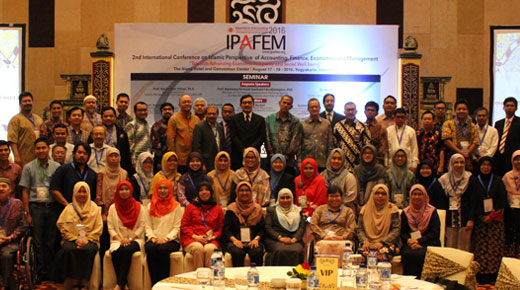
The 2nd International Conference on Islamic Perspective of Accounting, Finance, Economics, and Management (IPAFEM) 2016 is an international conference which aimed to give opportunity for academicians and practitioners in social science such as accounting, finance, management in order to discuss the challenges, trends, and innovations in business based on Islam perspective for the sake of advancing economics prosperity and social well-being.
In line with its objective, IPAFEM 2016 delivered a main theme "Towards Advancing Economics Prosperity and Social Well-being", Universitas Gadjah Mada had a great opportunity to host IPAFEM 2016. The event was held on Wednesday-Friday, 17-19 August 2016 in the Alana Hotel and Convention Center Yogyakarta. IPAFEM 2016 participants were academicians and practitioners from Indonesia, Qatar, Algeria, Pakistan, UK, the Netherlands, Malaysia, Brunei Darussalam and Saudi Arabia.
Prof. Nasim Shah Shirazi, Ph. D., was the first speaker in IPAFEM 2016. He is a Lead Research Economist in Islamic Research and Training Institute (IRTI). In his speech, he explained that zakat had an important role in building society well-being. Based on the data he had analyzed, it was shown clearly how immense the potential of a country in handling poverty if the society are willing to do zakat periodically. "Let us revive the religious teaching on charity and concretize their potential impact at social tax", said Prof. Nasim in order to ask the participants to contribute in proclaiming zakat.
The conference then continued by Research Forum titled "Researching Islamic Perspective of Accounting, Finance, Economics and Management" delivered by Prof. Roszaini Haniffa and Dr. Mohammad Hudaib. Prof. Roszaini Haniffa explained the stages of the development of sharia banks which is started by the uncomfortable feeling of Moslem with the interest system used by the conventional banks. Nowdays, sharia bank develops well in the society and starts to be the conventional banks’ competitor. "We try to find innovation on product, try to address at social justice level and make sure that every penny we get will go to the people who really need it", explained Prof. Roszaina in the interview session.
In the 3rd session, Publisher Talks, Dr. Mohammad Hudaib and Dr. Muniati Mukhlisin were the speakers. The theme in this session was "A Guide to Getting Published in JIABR". Both of the speaker delivered some ultimate ways for the participants to be able to make their papers successfully published in the international journals. Which of course it required a certain amount of time as they motivated the participants to always be patient and never give up.
The last speaker in the first day of the conference were Prof. Rosziana Haniffa and Mahfud Sholihin, ph. D. which talked about "Paper Writing Workshop". The first day of IPAFEM 2016 was closed by the parrarel session which the participants were invited to present their submitted papers. The participants were divided in to several room according to the paper theme.
In the second day of the conference, the event was opened by the opening speech by Dr. Mohammad Hudaib and Dr. Muhammad Edhie Purnawan whom representing of management the Faculty of Economics and Business Universitas Gadjah Mada. In his speech Dr. Edhie emphasized that the concept of accounting, management and the Islamic economy is now drawn attention from researchers from around the world.
After the opening speech, the next agenda would be presentation session and discussions from the keynote speakers. The discussion session was led by Dr. Anggito Abimanyu (BRI Sharia Commissionaire) as the moderator. The first speaker was Mr. Muhammad Irfan Sukarna as the Deputy of Director OJK. The theme he delivered was "Global islamic Finance Development and Indnesia’s Position". He said that the development of Islamic banks in Indonesia has a great development, thus it has a great prospect in the future. Indonesian population became one of its opportunity the increasing demand of banking products.
The next presentation was delivered by Dr. Hylmun Izhar (Senior Research Economist IRTI) with the theme "Mapping the Landscape of Islamic Financial Services Industry". He emphasized that the government as the policy makers has important roles in widening Islamic financial industry. The next presentation would be from Mr. Imam Teguh Saptono, President Director of BNI Sharia. The theme of his presentation was "Going Further with Islamic Banking". Imam explained that Islamic banking is the answer of the financial demand of Moslem society. He hoped that this will support the change of profit orientation to the concept of barokah. As the last speaker, Iggi H. Achsien, presented the theme of "Islamic Capital Market in Indonesia: Potentials and Challenges". "Indonesia is the only country which applied sharia stock trading system. The Islamic financial industry in Indonesia has a bright future", he said as he closed the discussion session on the second day of IPAFEM 2016.
It was such a different view and atmosphere in the night of the IPAFEM 2016’s second day. All of the participants and speakers were mingled in the Networking Dinner. The agenda was opened by the beautiful sound of gamelan. Tari Saman, with its quick yet unified dancing as the second performance, was presented. Prof. Dr. Komarrudin Hidayat held a light conversation that night. The Networking Dinner then was closed by a music collaboration by Dr. Anggito Abimanyu (flutist), Ade Rudiana (a professional percussion player) and Economics Session Band (ESB). The music collaboration was really beautiful and could invited participants to clap their hands and joining the rhythm of the music.
August 19th 2016, is the third and the last day of IPAFEM 2016. The agenda on the day was no as tight as the previous ones. A two-hours Pararell Session started the conference and continued by a closing speech by the Mayor of Sleman Region, Drs. Sri Purnomo along with the announcement of the best papers of IPAFEM 2016. Some other papers would be considered to be published in the special edition of Journal of Islamic Accounting & Business Research (JIABR).
Source: Ebnews